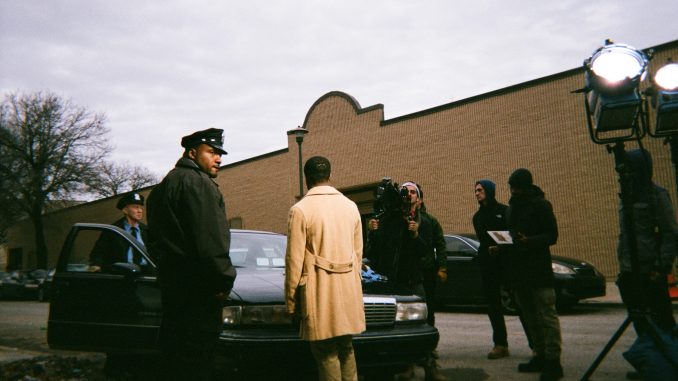
During Christian Nolan Jones’ high school career, he said he saw a new face from his community reflected on a “Rest in Peace” T-shirt nearly every other week.
“These things really do happen,” Jones, a filmmaker, said. “It is a great phenomenon in the Black community, but to a broader degree, nobody really knows about the practice of ‘Rest in Peace’ T-shirts.”
“Print Shop” is about Ishmael, a 17-year-old aspiring to be a high-fashion designer who makes and sells “Rest in Peace” or “Free My Homie” T-shirts. Ishmael faces a moral conflict when he realizes he is only profitable when a member of his community is either murdered or incarcerated.
Jones directed and co-wrote the short film “Print Shop” with Sean Valentine. The 30-minute film, shot primarily in North Philadelphia, is set in the early 2000s.
Ishmael is played by David Glover, a 2016 theater alumnus who is currently a graduate student studying acting at New York University.
Outside of his time in the army reserve, which Glover joined during his freshman year at Temple in 2011, attending NYU is the first time Glover has lived outside North Philadelphia. Glover said he was able to help Jones revise the script to make the film a more authentic representation of the area.
Glover was cast for the role in December 2015 after receiving an email sent to Temple’s theater students about the film. Although Glover was unable to make the original audition, Jones offered to hold a separate audition for Glover because “[Glover] had the look for the part,” Jones said.
“David is a very well-trained and calm actor,” Jones said. “We hadn’t had anybody up until that point that really was able to match the look with some sort of talent or enough experience to carry a 30-minute-long film.”
Jones, Glover and producer Gil Taveras identify with different parts of Ishmael’s character since they were all raised in urban environments.
“I feel like Ishmael is a person that’s at the crossroads of street culture, and the bigger picture of where you see yourself,” Taveras said. “Sometimes you have to try to do both to get there.”
Jones said growing up in a low-income area in Atlanta limited his career options, but he was ultimately able to pursue filmmaking. After high school, Jones attended Howard University, but lost his scholarship after the first year because he was unable to maintain the scholarship’s required GPA. Jones said he tried to appeal to the scholarship committee once his GPA was higher, but his appeal was declined.
A professor encouraged Jones to apply to the NYU film program, and received the necessary financial aid after explaining his financial situation to Joe Pichirallo, the chairman of the film program at NYU.
“I would say that [Ishmael and Jones’s circumstances] were largely similar in that I was an artist in a community that didn’t really appreciate art,” Jones said. “I kind of had to figure it out on my own.”
Valentine introduced “Print Shop” to Jones in April 2015. Valentine and Jones wrote the draft together and made trips to Philadelphia before deciding to move to 21st Street near Cecil B. Moore Avenue in November 2015 to shoot the film.
“Print Shop” has not yet been released to the public because the team is hoping to spread the word about the film through private screenings and develop it into a full-length film.
“I don’t think the full message was really achieved fully through the piece, because it is a short film,” Glover said. “There’s a lot more information to get, and there’s a lot more that could be put in in order for you to really capture what the essence of the film is. But, I do think that it fights hard to prove what the message is.”
The ending scene of “Print Shop” shows dead members of Ishmael’s community wearing all of the “Rest in Peace” T-shirts he made, with the exception of one. In the crowd, Taveras plays an extra and wears the “Rest in Peace” T-shirt of his best friend Christopher Richards, who was killed in 2013.
“Since Chris couldn’t be there, I just kind of wore it for him,” Taveras said.
Richards’ mother first learned her son was a part of the film in September when she attended a private screening in New York.
“She was so happy, because in a way I kind of made this for him,” Taveras said.
Jones said he worked on the film to “hint at a bigger picture of mass incarceration and industrialism.”
“What inspired it was real life situations and real life people that are victims to their communities,” Jones said. “It’s more than the names we see. … It’s a very real issue.”
Jenny Stein can be reached at jenny.stein@temple.edu.


Be the first to comment